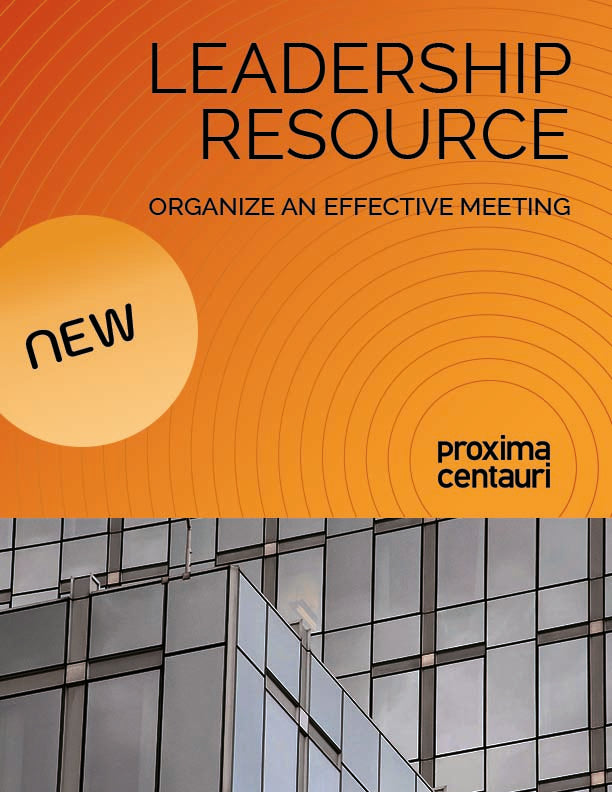The tool to boost your meeting efficiency
Are meetings a powerful asset or a waste of time?
Meetings are essential in the professional world. They facilitate information sharing, coordination, and critical decision-making. Yet, in many organizations, they are seen more as a burden than a performance tool. Too long, poorly prepared, and lacking clear objectives, they lead to frustration and wasted time. You’ve probably attended a meeting where discussions go in circles, some participants disengage while others dominate the conversation. By the end, few decisions are made, and even fewer are followed by concrete actions.
However, a well-structured meeting can be a powerful asset. It can mobilize a team, accelerate a project, foster effective idea exchange, and ensure everyone leaves with a clear understanding of the next steps. The difference between a productive meeting and a time-waster comes down to simple principles: thorough preparation, dynamic facilitation, and structured follow-up. Available in French.
Why are your meetings ineffective?
An ineffective meeting isn’t just a waste of time. It can create tension, disengagement, and a gradual loss of motivation within teams. Several factors contribute to meetings failing to produce concrete results:
- Lack of preparation: Without a clear objective, participants struggle to prepare and contribute effectively.
- Poorly structured agenda: Without a clear framework, discussions drift, and time is wasted.
- Uneven participation: Some speak too much, others not enough. A successful meeting engages everyone.
- Unclear or absent decisions: Without clear responsibilities and next steps, meetings have little impact on daily work.
- Lack of follow-up: If no one ensures agreed-upon actions are implemented, the meeting’s efforts are quickly forgotten.
A simple solution that will transform your meetings.
Our guide is designed to provide you with a structured, easy-to-apply method for improving your meetings. More than just a list of tips, it’s a practical tool that helps you optimize every aspect of your professional gatherings. With a straightforward approach, free from unnecessary complexity, this guide will help you run more efficient and productive meetings. Here is what you’ll find in this tool:
- Meeting preparation: How to define clear objectives, choose the right participants, and create a structured agenda.
- Meeting facilitation: Techniques to maintain engagement, manage time effectively, and encourage active participation.
- Post-meeting follow-up: Strategies for documenting decisions, assigning tasks, and ensuring follow-through.
- Tools and resources: A selection of practical tools to simplify meeting organization and management.
- 10 key questions for leaders: A guide to structuring meeting preparation and facilitation.
- Meeting formality levels: Tips on adapting the tone and format to the context and audience.
- Online vs. in-person meetings: Guidance on choosing the right format and optimizing both types.
- Innovative approaches: Creative ideas to energize your meetings and foster collaboration.
- Icebreaker activities: Suggestions to set a positive tone and encourage interaction from the start.
This guide will help you rethink and optimize your meetings so they become a true performance asset rather than a time drain.
Your state after a few weeks
With the tool:
- Clarity: Your meetings will always be structured around clear, shared objectives.
- Impact: Every discussion will lead to concrete, actionable decisions.
- Energy: Your meetings will be more dynamic and engaging for everyone.
- Control: You’ll master time management and keep meetings on track.
Without the tool:
- Confusion: Your discussions will remain disorganized, struggling to yield results.
- Drudgery: Meetings will still be long and draining, exhausting your team.
- Stagnation: Decisions will be delayed or poorly executed, slowing progress.
- Distraction: Time will continue to be wasted on secondary topics instead of priorities.
Productive meetings start here!
Stop enduring long and unproductive meetings. With the right approach, they can become a powerful driver of collaboration and performance. Do you want clearer, more dynamic, and truly effective meetings? Now is the time to act. Invest in better practices for yourself, your team, and your organization. Discover our tool and adopt a method that will optimize every meeting and turn your meetings into a real asset.
Have more questions? Check out our FAQ to learn more and get quick answers.
No refunds.


